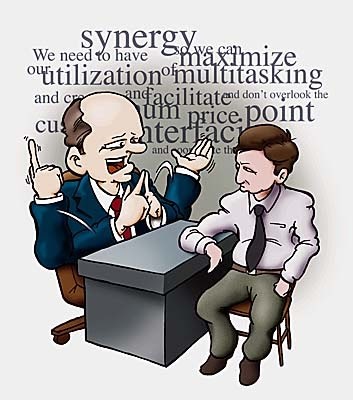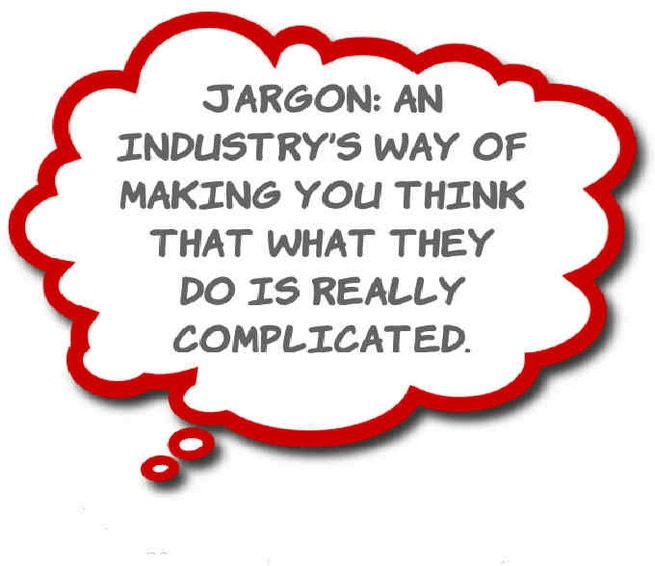Jargons are suffocating the management world. And this is not just an opinion but a fact. So what are Jargons. On searching high and mighty for the meaning of this word called “Jargon” I came across this “Official” meaning.
Noun : Jargon
Plural noun: jargons
Meaning: “Special words or expressions used by a profession or group that are difficult for others to understand”.
And frankly that’s exactly how it is used in the real world.

People have started using jargons a lot to show as if they really know something, while in reality, they may know nothing. This all started in US when white-collar jobs started making their presence felt and many new organizations started that were purely marketing, financial or IT based. With the onset of the white collar jobs, started, the concept of meetings. Within meetings people had to start using technical terms to show they know something; and soon those technical terms were laced with “Jargons” to further “Show off” their knowledge without really committing to anything or without having a grasp of what they were supposed to do in the first place.
Jargons have become a norm now and almost everyone is trying to outdo the other in coming out with more “Impromptu” and “Stylish” and “Better Sounding” jargons.
The problem with jargons is that no one knows what it truly means but professionals are supposed to take decisions based on words and sentences that are heavily laced with jargons.
Let me share a real instance with you.
One day when I was working in an IT products company leading a team in Japan for the very first “Anti-Fraud Management Engine” that would predict “Suspected Frauds” just by monitoring transactions in real time, my manager, who was notorious for never ever having clarity on what was going on, came up to us during one of the reviews and suggested that our approach towards providing solution should be a “Cookie Cutter Solution”. Just like you, we were not sure what it meant. The funny part was that none of the people present in the meeting room even asked what it meant as no one wanted to appear “Uninformed” and “not up with the things…”.
Later we came to know that he had spent half the day at a “Massage parlour” instead of going through the “Project Documentation” and was not updated about the project whatsoever but still wanted to show everyone that he is on top of things. Luckily we just continued with our own way of working and it became a resounding success.
That was my first encounter with “Jargon”.
I went on to observe that some of these “Professionals” had created their entire career on these “jargons” and if they did not use jargons everyone would know that their knowledge and management skills were probably less than ordinary.

From that moment on, whenever I entered an important meeting I would watch out for those uttering most Jargons and they eventually turned out to be people with the least grasp on the situation or have entered the meeting completely unprepared. I am not the only one who understood this. Soon this “management Jargon-in-mouth” disease spread far and wide and in all realms of organizational hierarchy, as it was an easy way out to sound impressive even if you are not well prepared. What is even worse, I saw that the senior most management and executives, people who make strategic decisions, tended to appreciate such utterances. This had the effect of spreading this disease even more deep into the organization.
As of now the world of Management is in a state of complete chaos with Jargons even having entered Professional courses and management schools.
Jargons seem to have a life of their own. It’s as if the management almighty thundered his commandments, “Here are your 10 Jargons, Go forth and multiply them”; and all the “Faithful” followed suite. Biblical proportions, you bet!
Let me give you some examples of jargons which people use regularly, and based on which business directions and management decisions are taken.
-
Cutting edge solution
-
State of the art
-
Ball park figure
-
Satellite view, 30,000 ft view, Top of the Mountain View, 40,000 ft view.
-
Lets play hardball.
-
Time to hit the ground running
-
The map has not changed just the topology (favourite among the Marketing guys)
-
Get the ducks in a row
-
Time to have your / our feelers out
-
Give me the Low down on this
-
Our management must be “Suite to nuts”
-
Value Added offerings
-
Customer delight
-
Customer Ecstasy
-
We need “disruptors”
-
Seamless integration
-
Bleeding edge
-
Game Changing
-
Drop dead date
-
Negotiating for more “Wiggle Room”
-
Lets put these Ideas on the “Backburner”
-
Mission Critical
-
Show stopper
-
That’s where the rubber meets the road
-
Insourcing, near sourcing, nearest insourcing
-
Silver bullet approach
-
Under the radar / Over the radar
-
Dis – ambiguate
-
Do we have the bandwidth
-
Lets take it up “Offline”
Whew….that’s a long list and it’s not even close to being done. I am sure 3 new Jargons were introduced to this fragile ecology of “Authentic Management” by the time you finished this blog. Imagine these words being dropped on you day and night and you would still be expected to deliver results.
If you get to hear more than 10 such jargons listed above in a 2 hrs meeting then for sure nothing worthwhile was done in that meeting.
“Just like an Octopus which spews ink when under threat to confuse its predator, professionals spew out Jargons when they are faced with a situation they are ill prepared with”. © PM-Pulse
Some companies actively discourage jargons within their communication and offices to ensure that everyone understands exactly what it means without much confusion.
Communication is the single most powerful thread that keeps an organization focused on its goals and if this communication is laced with Jargons just imagine what would happen to the communication clarity and disbursement.
This habit of using jargons have reached epidemic proportions and its high time we actively put an end to this and only use terms, words and acronyms that have a standard meaning in the line of business you are in.
Statistically speaking, at an average every single management professional spends 60% of his entire professional life in meetings. That is a huge chunk of time collectively within an organization and just imagine if most of this time is wasted due to incessant use of “Jargons”.
The thing about Jargons is that, we love it when we use it, and hate it when others use it. Jargons also tend to foster unhealthy politics within meetings. This makes it a rather complex management practice that should be just done away with.
It would be remiss if I do not differentiate “Jargons” from “Management Terms”. Terms are those words and sentences which have a specific meaning as they have been published by an Institute or a certification agency or the custodian of Industry Best Practices. For example, the term “Stakeholder” or “Gold Plating” has a specific meaning and is not open to interpretation as its mentioned in PMBOK Guide published by the Project Management Institute, USA, but the term “Coding Ninja” or “Serial Disruptor” has absolutely no “Standard” or “Documented” definition and hence is open to a plethora of interpretations.
So how do Jargons get created?
This is a rather unexplained phenomena. It has been observed that this is usually started by a rather influential person in a meeting or a speech or an industry specific meet or conference and tends to get adopted by multitudes of people over time. Some jargons become more circulated because they sound nice (E.g. Customer Delight) irrespective of who writes them. Many management experts feel that most jargons owe their origins to the “Marketing and Sales” literature created by so many marketing and sales professionals who are hounded to write “Something new” in their sales pitch or to create a “Differentiator”.
Whatever the case may be. Just stay away from Jargons. Do not use them. If someone else uses them then just insist on “meaning” or “explanation” of that jargon. This would dissuade others to use the jargons as well.
Using a “Slang”……… well that’s a completely different story for another blog.
Do the management world a favour… “Go forth and contribute to a Jargon free business world”.